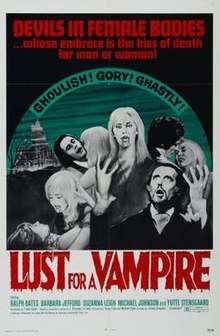Lust for a Vampire
Lust for a Vampire (also known as Love for a Vampire or To Love a Vampire (the latter title was the one used on American television)) is a 1971 British Hammer Horror film directed by Jimmy Sangster, starring Ralph Bates, Barbara Jefford, Suzanna Leigh, Michael Johnson, and Yutte Stensgaard. It was given an R rating in the United States for some violence, gore, strong adult content, and nudity. It is the second film in the Karnstein Trilogy, loosely based on the 1872 Sheridan Le Fanu novella Carmilla. It was preceded by The Vampire Lovers (1970) and followed by Twins of Evil (1971). The three films do not form a chronological development, but use the Karnstein family as the source of the vampiric threat and were somewhat daring for the time in explicitly depicting lesbian themes.
| Lust for a Vampire | |
|---|---|
 U.S. theatrical release poster | |
| Directed by | Jimmy Sangster |
| Produced by | Michael Style Harry Fine |
| Screenplay by | Tudor Gates |
| Based on | characters by Sheridan Le Fanu |
| Starring | Ralph Bates Barbara Jefford Suzanna Leigh |
| Music by | Harry Robinson |
| Cinematography | David Muir |
| Edited by | Spencer Reeve |
Production company | |
| Distributed by | MGM-EMI Distributors (U.K.) American Continental Films (U.S.) |
Release date |
|
Running time | 95 minutes |
| Country | United Kingdom |
| Language | English |
Production of Lust for a Vampire began not long after the release of The Vampire Lovers.
The film has a cult following, although some Hammer Horror fans have accused it of being overly camp and silly. Its most noted scene shows Yutte Stensgaard drenched in blood and partially covered by blood-soaked rags, although the filmed scene is not as explicit as that shown in a promotional still.[1]
Other notable actors in the film are Ralph Bates, Harvey Hall (who has a different role in each film of this series), David Healy and popular radio DJ Mike Raven as Count Karnstein. Karnstein's voice, however, is dubbed by an uncredited Valentine Dyall.[2]
Plot
In 1830, at a finishing school in Styria, Mircalla arrives as a new student. A visiting author, Richard LeStrange, instantly falls in love with her; but Mircalla is a vampire—Carmilla Karnstein—who has been resurrected by her vampiric family. As students in the school, inhabitants of the nearby village and those who suspect Mircalla is responsible start to die, suspicion turns toward the Karnsteins and their ominous castle.
Cast
- Yutte Stensgaard as Mircalla Herritzen/Carmilla Karnstein
- Michael Johnson as Richard LeStrange
- Ralph Bates as Giles Barton
- Barbara Jefford as Countess Herritzen
- Suzanna Leigh as Janet Playfair
- Helen Christie as Miss Simpson
- Mike Raven as Count Karnstein
- Harvey Hall as Inspector Heinrich
- Michael Brennan as landlord
- Pippa Steel as Susan Pelley
- Judy Matheson as Amanda
- David Healy as Raymond Pelley
- Jonathan Cecil as Biggs
- Erik Chitty as Professor Herz
- Jack Melford as bishop
- Christopher Neame as Hans
- Kirsten Lindholm as peasant girl
- Luan Peters as Trudi
- Christopher Cunningham as coachman
- Nick Brimble as 1st villager
- Sue Longhurst as schoolgirl
Production
Jimmy Sangster replaced Terence Fisher as director at very short notice. Partially due to censorship restraints from the British Board of Film Classification,[3] this film and the next one, Twins of Evil, had increasingly less overt lesbian elements in the story than did The Vampire Lovers. Carmilla, for example, in this film falls in love with a man. Ingrid Pitt was offered the lead, but turned it down. Peter Cushing was supposed to have appeared in the film, but bowed out to care for his sick wife. Cushing was replaced by Ralph Bates, who described Lust for a Vampire as "one of the worst films ever made".[4] Bates had earlier appeared in Taste the Blood of Dracula with Madeline Smith, who starred in the previous Karnstein film, The Vampire Lovers. The song "Strange Love" was recorded for the film by Tracy, a teen singer from Wembley and produced as a 45" by Bob Barratt.
Critical reception
The Hammer Story: The Authorised History of Hammer Films panned the film, calling it a "cynical and depressing exercise...", noting that "...one can only imagine what Fisher, Cushing and Bray's craftsmen might have made of Gates' reasonably literate draft."[5] However, The Hammer Vampire: British Cult Cinema by Bruce G Hallenbeck, says that "there is much to recommend it. I think it was a very good script," Tudor Gates told me (Hallenbeck), "I think, in a way, it was the better of the first two", with Hallenbeck noting that Gothic atmosphere is "ably evoked".
See also
References
- Huckvale, David (2009). Touchstones of Gothic Horror: A Film Genealogy of Eleven Motifs and Images. McFarland & Co. p. 105. ISBN 978-0786447824. OCLC 496518543.
- "Lust for a Vampire (1971) Full Cast and Crew". Internet Movie Database. Retrieved 30 June 2015.
- Hearn, Marcus; Barnes, Alan (2007). The Hammer Story: The Authorised History of Hammer Films. Titan. ISBN 1-84576-185-5.
- Maxford, Howard (1996). Hammer, House of Horror: Behind the Screams. Batsford. p. 110. ISBN 0-87951-652-6.
- Hearn & Barnes 2007, p. 142.
Sources
- Hearn, Marcus; Barnes, Alan (25 September 2007). "Lust for a Vampire". The Hammer Story: The Authorised History of Hammer Films [The Hammer Story] (Limited ed.). Titan Books. ISBN 978-1845761851. OCLC 493684031.